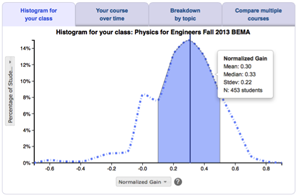
Developed by: Ruth Chabay and Bruce Sherwood



middle schoolhigh schoolintro collegeinter-mediateupper levelgrad school other

calc based








Overview
What? A modern calculus-based introductory curriculum with a radical change in content and emphasis, focusing on the power of fundamental principles and guiding students through the process of starting from these principles in analyzing physical systems, on both the macroscopic and the microscopic level.
Why? Many veteran teachers consider this method to be a true breakthrough in physics education due to its effective integration of modern physics in introductory courses. It is recognized for a focus on "Big Ideas" and extensive use of modeling to promote macro-to-micro conceptual understanding.
Why not? Computational modeling tasks are robust and will require close guidance and assistance from qualified teaching assistants to ensure student success.
Topic outline
VOLUME I: Modern Mechanics
- Interactions and Motion
- The Momentum Principle
- The Fundamental Interactions
- Contact Interactions
- Determining Forces from Motion
- The Energy Principle
- Internal Energy
- Energy Quantization
- Translational, Rotational, and Vibrational Energy
- Collisions
- Angular Momentum
- Entropy: Limits on the Possible
VOLUME II: Electric and Magnetic Interactions
- Electric Field
- Electric Fields and Matter
- Electric Field of Distributed Charges
- Electric Potential
- Magnetic Field
- Electric Field and Circuits
- Circuit Elements
- Magnetic Force
- Patterns of Field in Space
- Faraday’s Law
- Electromagnetic Radiation
Student skills developed
- Conceptual understanding
- Problem-solving skills
Instructor effort required
- Medium
Resources required
- TAs / LAs
- Projector
- Computers for students
- Cost for students
Resources
Teaching Materials
You can buy the Matter and Interactions book from Wiley.
You can find additional resources on the Matter and Interactions website.
Research
This is the third highest level of research validation, corresponding to:
- at least 1 of the "based on" categories
- at least 1 of the "demonstrated to improve" categories
- at least 1 of the "studied using" categories
Research Validation Summary
Based on Research Into:
- theories of how students learn
- student ideas about specific topics
Demonstrated to Improve:
- conceptual understanding
- problem-solving skills
- lab skills
- beliefs and attitudes
- attendance
- retention of students
- success of underrepresented groups
- performance in subsequent classes
Studied using:
- cycle of research and redevelopment
- student interviews
- classroom observations
- analysis of written work
- research at multiple institutions
- research by multiple groups
- peer-reviewed publication
References
- M. Caballero, E. Greco, E. Murray, K. Bujak, M. Marr, R. Catrambone, M. Kohlmyer, and M. Schatz, Comparing large lecture mechanics curricula using the Force Concept Inventory: A five thousand student study, Am. J. Phys. 80 (7), 638 (2012).
- R. Chabay and B. Sherwood, Bringing atoms into first-year physics, Am. J. Phys. 67 (12), 1045 (1999).
- R. Chabay and B. Sherwood, Modern mechanics, Am. J. Phys. 72 (4), 439 (2004).
- R. Chabay and B. Sherwood, Restructuring the introductory electricity and magnetism course, Am. J. Phys. 74 (4), 329 (2006).
- L. Ding, R. Chabay, and B. Sherwood, How do students in an innovative principle-based mechanics course understand energy concepts?, J. Res. Sci. Teaching 50 (6), 722 (2013).
- M. Kohlmyer, M. Caballero, R. Catrambone, R. Chabay, L. Ding, M. Haugan, M. Marr, B. Sherwood, and M. Schatz, Tale of two curricula: The performance of 2000 students in introductory electromagnetism, Phys. Rev. ST Phys. Educ. Res. 5 (2), 020105 (2009).
- E. Seung, Examining the development of knowledge for teaching a novel introductory physics curriculum, Dissertation, Purdue University, 2007.
- S. Weatherford, Student Use of Physics to Make Sense of Incomplete but Functional VPython Programs in a Lab Setting, Ph.D., North Carolina State University, 2011.
- S. Weatherford and R. Chabay, Student predictions of functional but incomplete example programs in introductory calculus-based physics, presented at the Physics Education Research Conference 2012, Philadelphia, PA, 2012.




